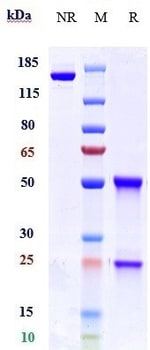Learn More
Invitrogen™ IL-21 Monoclonal Antibody (eBio3A3-N2 (3A3-N2)), eBioscience™, Invitrogen™
Mouse Monoclonal Antibody
Brand: Invitrogen™ 14-7219-81
Description
Description: The monoclonal antibody eBio3A3-N2 reacts with human IL-21, a potent stimulator of NK and cytolytic T cells. IL-21 is a 131 amino acid protein most closely related to IL-2 and IL-15. Expression is found in CD4+ cells upon activation. In addition to its effect on NK cells, IL-21 stimulates proliferation of B-cell stimulated by crosslinking of the CD40 antigen and stimulates the proliferation of bone marrow progenitor cells and the expression of the NK-cell marker CD56 in the presence of IL-15. Applications Reported: The eBio3A3-N2 antibody has been reported for use in ELISA capture of IL-21 analysis. Applications Tested: The eBio3A3-N2 antibody has been tested as the capture antibody in a sandwich ELISA for analysis of human Interleukin-21 (IL-21) in combination with the biotin eBio2B2-G20 (cat.13-7218) antibody for detection and recombinant standard human IL-21 (cat. 39-8219) as the standard. A suitable range of concentrations of this antibody for ELISA capture is 1-4 μg/mL. A standard curve consisting of doubling dilutions of the recombinant standard over the range of 4000 pg/mL - 60 pg/mL should be included in each ELISA plate. Purity: Greater than 90%, as determined by SDS-PAGE. Aggregation: Less than 10%, as determined by HPLC. Filtration: 0.2 μm post-manufacturing filtered.
IL-21 is a 17 kDa immunomodulatory cytokine produced mainly by Natural Killer Cells (NKT), T helper (Th) 17 and T follicular helper (TFH) cells. In TFH cells, IL-21 expression leads to autocrine signaling through the IL-21 receptor (IL-21R) and STAT3, which leads to additional transcriptional activation by Bcl6. As with IFN gamma for Th1 and IL-4 for Th2 cells, IL-21 is critical for TFH cell development and effector function. IL-21 plays a role in T cell-dependent B cell differentiation into plasma cells and memory cells, stimulation of IgG production and induction of apoptotic signaling in naive B cells. In Th17 cells, IL-21 expression and autocrine feedback through STAT3, IRF4 and ROR gamma t lead to upregulation of the IL-23R, thereby preparing Th17 cells for maturation and maintenance by the inflammatory cytokine IL-23. While upregulating IRF4 and ROR gamma t, IL-21 also mediates the downregulation of Foxp3. IL-21 deficient mice are protected from developing colitis upon chemical treatment by their inability to upregulate Th17-associated molecules. In comparison, elevated levels of IL-21 are present in chemically-induced colitis mouse models.
Specifications
| IL-21 | |
| Monoclonal | |
| 0.5 mg/mL | |
| PBS with 0.09% sodium azide; pH 7.2 | |
| Q9HBE4 | |
| IL21 | |
| Affinity chromatography | |
| RUO | |
| 59067 | |
| 4°C | |
| Liquid |
| ELISA | |
| eBio3A3-N2 (3A3-N2) | |
| Unconjugated | |
| IL21 | |
| CVID11; CX2; il 21; IL21; IL-21; ILN; Interleukin; interleukin 21; Interleukin21; interleukin-21; interleukin-21 isoform; porcine interleukin-21; Za11 | |
| Mouse | |
| 50 μg | |
| Primary | |
| Human | |
| Antibody | |
| IgG1 κ |
Product Suggestions
Customers who viewed this item also viewed.
Your input is important to us. Please complete this form to provide feedback related to the content on this product.
For Research Use Only.

















